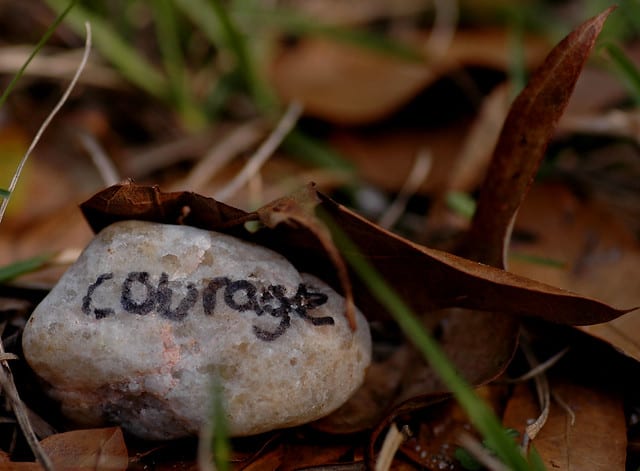
In Rev. 21:8 we read, “But for the cowardly… their place will be in the lake that burns with fire and sulfur, which is the second death.” It is interesting to me that cowardice is the first item on a list that goes on to include murderers, fornicators, sorcerers, and idolaters, among others. This is because John was writing to Christians who were going to need courage in order to endure suffering and remain faithful to Jesus. Courage continues to play a key role in Christian faithfulness to this very day.
Safety in Numbers
Human beings are social creatures. Even a hard-core introvert like me still feels the need to be part of a social group. There is something hardwired into our psyche that drives us to seek acceptance by a peer group. Once we’ve achieved good standing in the group, we’ll typically protect it whatever the cost.
I’ve heard people say that social affirmation stimulates certain chemicals or hormones in the body that make us feel good. Evolutionary biologists suggest that this evolved as a self-preservation mechanism. Primitive humans were safer in large groups, so the body evolved a mechanism that rewards individuals with “happy feelings” when they experience affirmation from the group. This affirmation and its corresponding happy feelings motivate the individual to maintain his or her good standing in the group. This, in turn, keeps the individual safe.
I don’t know enough about biology to affirm or challenge these explanations. I cite them only to illustrate that the power of group acceptance is universally recognized. As such, great effort has been made to explain the phenomenon. Whatever its origin and whatever purpose it serves, our natural instinct is to find safety in a group. Most people will maintain that safety at any cost. When safety is threatened, fear of loosing the security of the group will drive people to do whatever is necessary to reestablish their standing in the group and by extension, their safety.
Affirmation, Acceptance, and Fear of Alienation
The biggest threat to group safety is the group itself. If the group determines that one of its members is no longer welcome, it will expel the undesirable member. This member will find himself or herself in a very vulnerable, perhaps dangerous position. Perhaps there is some truth to the primitive human explanation. A person alone in a dangerous world of predators and limited resources probably wouldn’t survive long.
In 21st century America, we don’t live in that kind of dangerous world. Nevertheless, something compels us to establish and maintain group safety. Instinctively, we seem to know that our status is always precarious. Acceptance by the group must be maintained.
For modern humans, group acceptance is generally a matter of affirmation. Group identity is defined by acceptance and affirmation of a common set of values. Good standing in the group is maintained by regular demonstrations that reaffirm the group values. The member that fails to make the necessary demonstrations, or worse openly challenges the group values runs the risk of censure. This may eventually lead to alienation and expulsion from the group.
Interestingly, most groups appear to be reluctant to lose their members. When a member begins to exhibit attitudes and behaviors that deviate from group norms, the group will use a variety of tactics to redirect the individual back toward the norm. Shaming, mockery, threats, and even violence may be employed to correct the deviant. Expulsion is typically a last resort. The larger the group, the greater the sense of security. By contrast small groups feel vulnerable to large groups. Loss of membership makes the group more vulnerable and undermines its sense security.
Courage over Group Safety
Self-preservation is the most basic of human instincts. It’s so powerful that it takes a conscious and concerted effort to overcome it. According to the Merriam-Webster dictionary, courage is the mental or moral strength to venture, persevere, and withstand danger, fear, or difficulty. It implies a firmness of mind and will in the face of danger or extreme difficulty.
Since group acceptance works hand in hand with self-preservation, it is easy to see why people are so reluctant to jeopardize the standing within their social group. These are two very powerful impulses with strong emotional drives. This also explains why courage is necessary when one must make a choice that will result in loss of group acceptance.
Courage engages when one concludes that there is a greater good, a higher right action or correct belief, than the instinct for self-preservation. It’s a settled disposition that one develops through training the mind and emotions to value something more than safety. Thus, courage walks hand-in-hand with knowledge and wisdom. The belief and the will to act in line with a higher good must be stronger than this powerful instinct of self-preservation. Only courage can overcome the need for the safety of the group.
Courage v. Defiance
It’s this sense of greater good that differentiates courage from mere defiance. For some, their sense of identity is built around flipping the bird to social norms and conventions. Individuals who share this value form their own groups that reinforce these attitudes and behaviors. Sadly, the norms of the group are actually still determined by society at large. For such people, everyday is opposite day. There is no originality to their values, no sense of greater good. There is only reaction. Their identity could be anything, so long as it breaks from social norms. Even more sadly, many confess Christ for this reason alone.
The defiant are often praised as courageous. However, there is an important difference. For the courageous, as already noted, the source of their courage is their conviction that there is a greater good that supersedes self-preservation. By contrast, the defiant engage in a form of narcissism that artificially inflates the ego. They interpret their defiance as evidence of their superiority to the masses. All of life is reduced to not yielding to the crowd. Identity is based solely on rejection.
Christian Courage
This brings us back to Rev. 21:8. John uses strong language to describe those who lacked the courage to publically proclaim faith in Christ. He calls them “cowards.” Not surprising coming from a guy who, along with his brother, was called a “son of thunder.”
The primary form of persecution and suffering for Christians in the first century was social isolation. Exclusive allegiance to Christ as lord frequently resulted in suspicion, fear, and hostility from one’s social group. Then, as now, mockery, threats, and violence were used to get these deviants back in line with civil society. Those who wouldn’t were outcasts.
Back then, Christians were more vulnerable than modern Americans. Without their social network, they would have had great difficulty supporting themselves and their families. Beyond this, just like us, they simply desired the approval of their peers. Additionally, they hoped to improve their financial situation and social standing. Being socially marginalized made all these things impossible.
Outside of America, these conditions continue to this very day. Around the world, Christian brothers and sisters daily have to decide between group safety and the public proclamation of their allegiance to Christ. They have to develop a settled disposition that it’s more valuable to proclaim Christ than to enjoy the safety and comfort of the group.
The Need for Church
The church is like other social groups. Its identity is grounded in its members’ shared commitment to the lordship of Jesus Christ. However, it’s more than merely a social group. It’s the kingdom of God. We’re a group defined by the reign of God.
Christians have an obligation of love. We are to live as a new group that provides its members with the safety they desire. Each of us has had to act courageously, to renounce our former group allegiances. That courage must be rewarded by acceptance into this new group organized around our shared confession.
Since God’s people will always be outnumbered, courage will still be a necessity. The group that opposes us is larger than ours. Therefore, we need to spend as much time together as possible and spur one another to greater acts of courage.
Let’s continually remind one another that, though the lake of fire awaits the cowardly, the courageous will ultimately conquer the world. When Jesus returns, he will bring his kingdom with him. As members of God’s household, we will inherit the kingdom. Encourage one another with these words.













